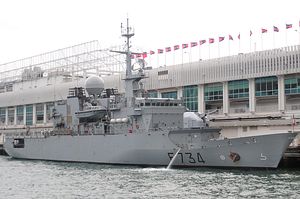This week, a spokesperson for the Chinese Ministry of Defense accused France of “illegally entering Chinese waters.” Following this apparent transgression, Beijing withdrew the French Navy’s invitation to participate in the naval parade off Qingdao to commemorate the 70th year of the People’s Liberation Army Navy.
Given the nature of China’s complaint, one might think that the French Navy had conducted a freedom of navigation operation through the Paracel Islands, where China has illegally established straight baselines, or through the Spratly Islands, near Beijing’s seven artificial islands. Indeed, Chinese officials have claimed the South China Sea nearly in its entirety as “Chinese waters” for some time.
But France’s action was nothing of the sort. Earlier this month, a French warship sailed through the Taiwan Strait—a waterway some 80 nautical miles in width on average. While the move was reported in certain outlets as “rare” for the French Navy, it appears not to have been so. One French official tells the Financial Times that the French navy conducted these sorts of transits annually.
Senior Colonel Ren Guoqiang, spokesperson for the Chinese Ministry of National Defense, commented on the French transit on Thursday. “China’s military sent navy ships in accordance with the law and the rules to identify the French ship and warn it to leave,” he said. “China’s military will stay alert to firmly safeguard China’s sovereignty and security,” he added.
Curiously, following the press conference, the Chinese Ministry of Defense appears to have omitted Ren’s answer from the official transcript. As China-watcher Bonnie Glaser at the Center for Strategic and International Studies suggested on Twitter, Ren may have “misspoke” and his comments Thursday were not meant to signal a shift in Chinese policy to consider the entirety of the Taiwan Strait as “Chinese waters.” Either way, reporters present heard the remarks and, even if ambiguous, Ren did contest the legality of the French transit.
Per the United Nations Convention on the Law of the Sea (UNCLOS), which China has ratified, much of the Taiwan Strait—outside of the 12 nautical mile territorial waters off China’s immediate coast—is available to military and civilian vessels from any country for transit. Per UNCLOS, military vessels are even free to conduct surveillance and other military activities lawfully in the region.
China has protested U.S. Navy movements through the Taiwan Strait over the years. These transits have intensified since 2017, in line with the Trump administration’s adoption of a more hardline stance toward China more generally. But unlike the United States, which has a special unofficial relationship with Taiwan under the aegis of the forty-year-old Taiwan Relations Act, France was largely exempt from China’s ire.
So why complain about a French transit of the Taiwan Strait now? One reason may be Paris’ growing interest in supporting the United States, Japan, and other regional powers concerned about China in the Indo-Pacific more broadly. France, with its overseas territory, has a population of more than 1 million citizens residing in the region and a massive Indo-Pacific exclusive economic zone of its own. As a result, Paris has in recent years pledged to be more present in the region.
Earlier this year, for instance, France and Japan held so-called “two-plus-two” talks bringing together their top defense and foreign officials to pledge cooperation on maritime issues in the region. Even before the current administration of French President Emmanuel Macron, the French government took an interest in the region.
In 2016, Jean Yves Le Drian, then France’s defense minister and now its foreign minister, told regional security experts at the Shangri-La Dialogue in Singapore that France would support “regular and visible” patrols by the European Union in the South China Sea. “Several times per year, French navy ships cross the waters of this region, and they’ll continue to do it,” Le Drian had said.
Beijing’s decision to protest France’s transit now suggests that is taking a greater interest in the further involvement of what it sees as extraregional powers taking a greater stake in what goes on in the waters off China’s coast. Such a message will no doubt also be received in the United Kingdom as London plans to sustain its presence in the region as well. Last year in August, HMS Albion conducted a freedom of navigation operation near the Paracel Islands, for instance.
As France and the UK commit greater resources to the region, Beijing sees a threat to its interests. Given the outcome of the meeting at the end of March with Macron, German Chancellor Angela Merkel, European Commission President Jean-Claude Juncker, and Chinese President Xi Jinping, it’s more apparent too that Europe more broadly could position itself in a more openly confrontational way toward China. Its in this broader context that China’s reaction to what should have been a mundane—and ultimately lawful—French naval transit of the Taiwan Strait should be understood.

































